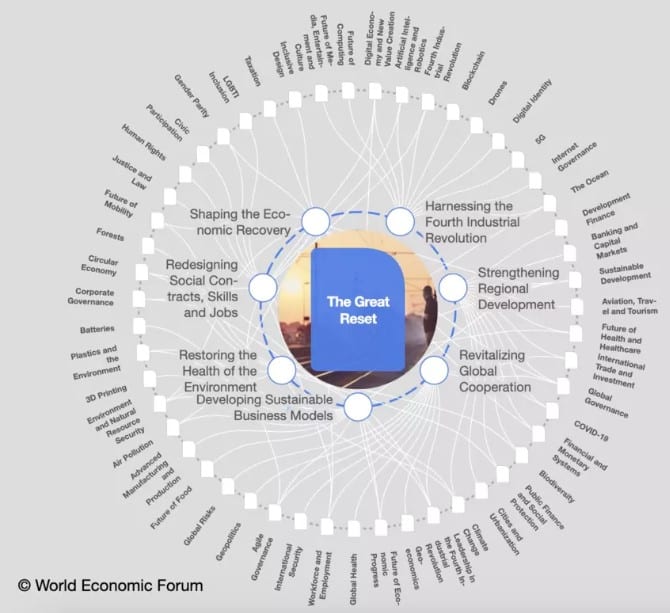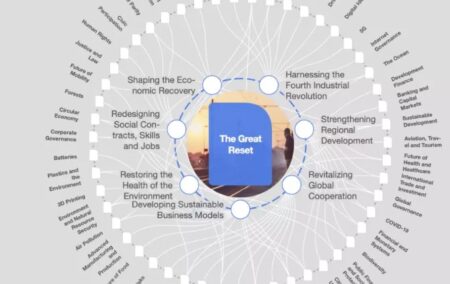Free market principles are often dismissed as benefiting the rich at the expense of the poor. Why, then, do so many of the world’s actual rich people agitate against free markets?
In every crisis lies opportunity. Never let a good crisis go to waste. One glib adage after another cautions us to look for silver linings in every dark cloud, and warns us that others, too, will seek to exploit misfortune for their own gain.
So it is with the World Economic Forum (WEF). This body is an unelected, undemocratic, and unaccountable global conclave of wealthy, powerful, and famous elites.
When the coronavirus pandemic struck, it wasted no time formulating an agenda ominously named the Great Reset. Ostensibly, it is designed to take advantage of the economic destruction of lockdowns to rebuild the global economic in a way that ‘improve[s] the state of the world’.
Although the organisation has no mandate from anyone to ‘revamp all aspects of our societies and economies’, this is exactly what they propose. ‘Every country, from the United States to China, must participate,’ they admonish, ‘and every industry, from oil and gas to tech, must be transformed.’
You’ll own nothing
To give an idea of the future that the global elite has in mind for us, a WEF video that began to circulate on social media in December – and has subsequently been deleted – argued that ‘You’ll own nothing, and you’ll be happy.’
It was largely based on this WEF blog post from 2016: ‘8 predictions for the world in 2030’.
It would be mistaken to interpret the ‘you’ll own nothing’ line as an outright endorsement of socialism, a system under which the state owns the means of production and the economy is subject to central planning.
It is worse. It is an endorsement of the idea that corporate elites will own everything, and the rest of us will rent or ‘borrow’ things as we need them. Communication, clean energy, transportation, food, accommodation, and all the other things will not become services, instead of products, but they’ll be free. And they’ll be free because other people will also use our stuff.
It is hard to see how producing free stuff for people to borrow and share creates value for the producer, so one can only assume producers will be forced to produce these things by government decree.
‘My living room is used for business meetings when I am not there,’ wrote the person who made this prediction, Danish member of parliament, Ida Auken. As if anyone would want strangers traipsing through their home when they’re not there.
Work will be taken over by robots and artificial intelligence, so the nature of work will change. ‘I don’t really know if I would call it work anymore. It is more like thinking-time, creation-time and development-time,’ wrote Auken.
How idyllic. My work, writing, is already all about thinking and creating, and while I enjoy my work, I certainly consider it work.
In her brave new world, there won’t be any privacy. ‘I just hope that nobody will use it against me,’ she said, naïvely. She clearly has infinite trust in the benevolence of governments and of the corporate plutocracy.
‘They trust me, dumb fucks,’ said Mark Zuckerberg, when he launched Facebook in 2004. Auken trusts Zuckerberg. I don’t.
The good life
It is a good life, she wrote, because in the past, ‘[w]e had all these terrible things happening: lifestyle diseases, climate change, the refugee crisis, environmental degradation, completely congested cities, water pollution, air pollution, social unrest and unemployment.’
Magically, handing the economy over to government and corporate control will eradicate all these problems. Imagine the totalitarian lengths they’d have to go to in order to eliminate climate change, lifestyle diseases, social unrest, and even unemployment.
Yet Auken believes this good life won’t be for everyone. ‘My biggest concern is all the people who do not live in our city,’ she wrote. ‘Those we lost on the way. Those who decided that it became too much, all this technology. Those who felt obsolete and useless when robots and AI took over big parts of our jobs. Those who got upset with the political system and turned against it. They live different kind of lives outside of the city. Some have formed little self-supplying communities. Others just stayed in the empty and abandoned houses in small 19th century villages.’
And there we have it. We must all accept the hyper-urbanised world of corporate control without privacy and without property, or we’ll be left behind in the awful, poor, and backwards countryside.
The WEF envisions a global carbon tax that makes efficient, flexible and reliable forms of energy prohibitively expensive, forcing people to use unreliable sources of energy instead. It envisions a world in which meat is a rare luxury, much like it was for our ancestors who lived in poverty and faced a constant struggle against hunger and malnutrition.
Three components
The Great Reset seeks to ‘build a better society’. It will require, and I quote, ‘stronger and more effective governments’ and will ‘demand private-sector engagement every step of the way’.
To achieve this, the Great Reset would first ‘steer the markets to fairer outcomes’.
‘To this end, governments should improve coordination (for example, in tax, regulatory, and fiscal policy), upgrade trade arrangements, and create the conditions for a “stakeholder economy.” At a time of diminishing tax bases and soaring public debt, governments have a powerful incentive to pursue such action.
‘Moreover, governments should implement long-overdue reforms that promote more equitable outcomes. Depending on the country, these may include changes to wealth taxes, the withdrawal of fossil-fuel subsidies, and new rules governing intellectual property, trade, and competition.’
So, forget about free markets and free trade. Global elites seek to usurp the powers of government to control them and force them into submission to their own goals.
The second component of the Great Reset is to ‘ensure that investments advance shared goals, such as equality and sustainability’. And by ‘shared goals’, they mean, of course, goals shared by the elites that gather at Davos to discuss the future of the other 7.8 billion people on the planet.
‘Here, the large-scale spending programs that many governments are implementing represent a major opportunity for progress. The European Commission, for one, has unveiled plans for a €750 billion ($826 billion) recovery fund. The US, China, and Japan also have ambitious economic-stimulus plans.
‘Rather than using these funds, as well as investments from private entities and pension funds, to fill cracks in the old system, we should use them to create a new one that is more resilient, equitable, and sustainable in the long run. This means, for example, building “green” urban infrastructure and creating incentives for industries to improve their track record on environmental, social, and governance (ESG) metrics.’
No longer will investors choose the goals of their own investment. No, the global elite will choose their goals for them.
Of course, Davos man (and woman) has extensive financial interests in ‘green’ industries, and knows that many of those businesses will not be ‘sustainable’ without being lavishly funded by other people’s money. They resent competition from companies that are more efficient and more cost-effective, but less idealistic.
So they propose using the government’s power to confiscate money from the plebs, the peons and the serfs. Or they’ll demand that governments just print money. And to seal the deal, they want to make sure there is nowhere to flee.
We’ve all seen where newly printed money ends up. Little, if any, goes to the poor. (And please, a once-off ‘stimulus’ cheque, or a R350 per month handout, doesn’t count.)
On the contrary. When the central bank printers spin up, it devalues the money in your pocket and siphons it to the banks. From there, it either ends up in corporate cash piles, or in stock markets – which have been soaring despite the devastation wrought by coronavirus lockdowns. It should surprise nobody that billionaires – the Davos set – got richer while the rest of us got poorer in 2020.
If that isn’t enough, the WEF wants government to use its monopoly on force to steal even more money from ‘private entities and pension funds’, to be invested into the elites’ favourite businesses.
The third component of the Great Reset is to ‘harness the innovations of the Fourth Industrial Revolution’ but other than signalling the desire to deploy technology in ways the global elites would prefer, such as automated surveillance, this is public relations guff we can ignore for now.
Totalitarianism
If you have any doubts about the all-encompassing totalitarianism of the WEF’s agenda, look no further than its own Great Reset Transformation Map:

There are ‘strategic intelligence’ documents on every single one of these subject areas. If you’re registered on their site, you can drill down on each item, and get perspectives on every one of them.
Of course, not every objective is inherently undesirable. Many of them sound wonderful. It is the means by which they are to be achieved that should give us pause.
The Great Reset is an extremely detailed blueprint for rebuilding the global economy from the ground up, and to place it under the control of governments, who in turn are ‘guided’ by the crony-capitalists, the billionaires, the bankers, the politicians and the celebrities that hobnob in Davos every year.
Free markets and the rich
What all this teaches us is that the free markets ideology advocated by libertarians and classical liberals is not an economic policy that favours the rich at the expense of the poor.
It doesn’t seek to exploit government power to benefit the corporate interests of the global elites. It doesn’t advocate central planning, by corporations or states, to achieve ‘shared goals’.
It recognises that everybody’s wants and needs are different, and that only individuals should have the power to decide how best to deploy their productive labour, and how best to spend the income that this earns them.
It seeks to leave everyone in control of their own destiny, school their children how they see fit, seek medical care appropriate to them, and acquire, invest and dispose of their property in their own best interests.
The Great Reset objectives could have been written by Naomi Klein, or Occupy Wall Street protestors, or World Trade Organisation rioters, or Heathrow runway agitators, or Greenpeace activists.
They are the ‘shared goals’ of leftwingers and socialists. The global elite of the WEF recognised that unlike free markets, the left’s naïveté and statism can far more easily be harnessed by the corporate plutocracy to enrich themselves.
All they need to do is position themselves to benefit when they convince governments to seize control over private property and private contracts.
The Great Reset is no different from the utopian ideals of the socialists in the ANC, or the Sanders/AOC wing of the Democratic Party, or the British Labour Party, or the socialist parties of Europe, or even the Chinese Communist Party.
Defending free markets, private property, individual freedom, and voluntary exchange places you in polar opposition to the rich and the powerful. It places you in opposition to Klaus Schwab, Batty Prince Charlie, and Leonardo di Caprio. It places you in opposition to the unholy alliance between governments and big business.
It places you on the side of ordinary men and women, just trying to survive under the heel of their oppressive, incompetent and corrupt governments and the powerful elites who would hijack the state’s power for their own mercenary ends.
The Great Reset is good for Davos man. Free markets are good for everyone.
The views of the writer are not necessarily the views of the Daily Friend or the IRR
If you like what you have just read, support the Daily Friend
Image: World Economic Forum, https://commons.wikimedia.org/wiki/File:World_Economic_Forum_2017_(32243411301).jpg

